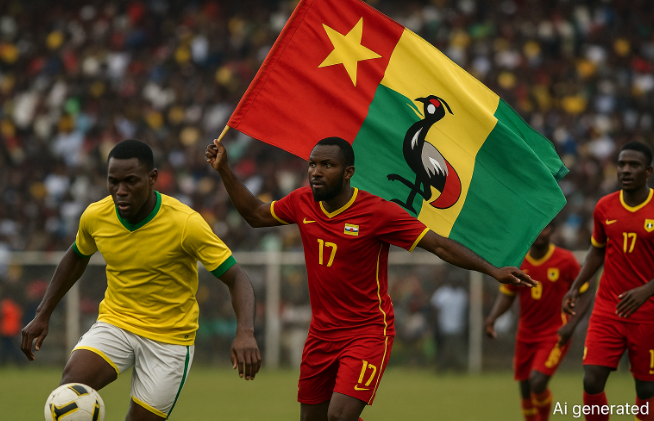
Football and Politics in Africa: When a Match Is More Than a Game
August 19, 2025 12:52 pm Leave your thoughtsThe last whistle does not necessarily imply the finish. In African football, matches are played a long way beyond the football pitch, into the political campaigns, the national arguments, and even into international relations. Objectives are symbolised as goals. The coaches turn into national heroes or martyrs. But in some cases, the result of 90 minutes is capable of creating the storylines that extend far beyond sport itself.
Football and politics have often gone hand in hand on the continent, ranging from independence movements to presidential elections. It is not a metaphor. It is a fact that is hard-coded into how states articulate nationality, competition, and endurance.
Where Sport and Statecraft Collide
In Africa, football is not merely a source of entertaining people it is a political language. The governments had a long time to comprehend its possibility to become a uniting power, a distracting factor, or even a sort of a pressure vent in case of some national emergency.
Legacy of Post-Independence Power
In many African countries, football and politics became fused in the decades following independence. Even the emergence of a sports betting site culture during politically significant fixtures has been interpreted by some as a modern extension of state influence on fan mobilization and national sentiment. National teams were built not only to compete but to represent a nation’s strength on the world stage. The leaders, and mostly the leaders of the 1970s and 1980s, used to intrude themselves in the team matters publicly as well as behind the scenes.
Idi Amin of Uganda, a self-styled “President for Life,” famously meddled in football decisions and used national team appearances as part of his propaganda machine. In Zaire (now DR Congo), Mobutu Sese Seko demanded results from the national team during the 1974 World Cup, threatening players with exile if they performed poorly. That team was the first sub-Saharan African side to play in the tournament—and also the first to face state-imposed consequences for losing.
This top-down politicization of the sport persisted, with presidents appointing football federation heads or pressuring coaches to select players from certain regions. The symbolism was often as important as the scoreboard.
Football and National Identity Today
In recent years, this fusion has taken a more nuanced turn. A wide range of actors—from national ministries to broadcasters and sponsors—have found ways to align their messaging with moments of national football relevance. During Ghana’s 2024 elections, both major political parties referenced the national team’s performance as an example of “national unity through shared pride.” This positioning wasn’t accidental—it was carefully orchestrated through appearances at matches, pre-recorded video messages, and symbolic donations to youth academies.
Football as a Political Instrument: The Modern Playbook
In the present times, to have an influence, political leaders need not own a football club. They apply symbolism, media, and policy in order to identify themselves with an outpouring of emotions, with a winning national team.
Case Studies from the Last Two Years
These are only a few recent examples of African governments still perceiving football as one of the instruments in the political arsenal:
- Cameroon, 2022 AFCON: President Paul Biya’s administration used the tournament to project national unity amid regional unrest. Public funds flowed into stadium construction, and players were paraded at official state events.
- Kenya, 2023: When the Harambee Stars beat Egypt in a surprising 2–1 qualifier, the sitting president personally awarded each player with cash bonuses on live TV. The move came weeks before a tight mid-term election.
- Burkina Faso, 2024 Coup Context: The military-led government leveraged the national team’s performance at CHAN as a morale booster. State-run media heavily broadcast games, and public screenings were staged in key city squares under military security.
It is not mere populism. There is nation-branding: it is a calculated thing, frequently effective, occasionally disputable.
National Rivalries, Real Tensions
When two African powerhouses meet on the pitch, it’s rarely just a game. National identity, historical grievances, and political undercurrents shape how fans and governments respond.
Take the North African rivalry between Algeria and Morocco. In early 2023, a diplomatic standoff led to Algeria closing its airspace to Moroccan planes, which complicated travel logistics for the U23 Africa Cup of Nations. When the two sides finally met in a friendly later that year, chants in the stands and comments by ministers reignited public debate over the broader political freeze between the countries.
A similar undercurrent played out between Nigeria and South Africa during the 2024 Women’s Olympic qualifiers. In a tightly contested match, political tensions over trade negotiations spilled into sports commentary and talk shows, highlighting how quickly football can turn into a proxy battlefield.
Politically Charged Matches (2018–2024)
Here’s a sample of high-stakes games where political tensions were reflected—or directly involved—in the football arena.
| Year | Match | Political Context | Notable Fallout |
| 2019 | Egypt vs. South Africa (AFCON) | Arab Spring legacy and regional power struggles | Increased anti-government protests in Cairo |
| 2021 | Mali vs. Guinea | Post-coup national sentiments | Public rallies tied to match results |
| 2023 | Morocco vs. Algeria | Border closures and diplomatic rupture | Game postponed; public outcry on both sides |
| 2024 | Nigeria vs. South Africa | Trade deadlock and election cycles | Players asked to comment on political ties |
Here’s a sample of high-stakes games where political tensions were reflected—or directly involved—in the football arena.
When Players Become Political Actors
Political football is not devoid of outside influence. Sometimes, players come into the picture – voluntarily, involuntarily, or both.
Many consider the controversy behind Samuel Eto’o’s appointment as President of the Cameroonian Football Federation as purely politically motivated. As a footballer and public figure, he has the means to mold and tacitly reengineer public views and influence numerous decision-makers.
The Zimbabwean national team captain Knowledge Musona faced an indefinite ban from international duty for rather selfish reasons. His overwhelming popularity upon return transformed him into a disillusioned hero for the political issues at hand.
Across the continent, outspoken star athletes publicly address matters relating to elections, human rights, and governance. This is a welcome local development, and although it is not totally different from what is happening elsewhere, it is startling for those areas where belief in politicians has collapsed and sportspeople are held in high regard.
Football as Protest and Resistance
Protests can form in the field of work for many reasons, and in this case, we will see how football is turned into a medium of protest.
During the 2023 CAF Confederation Cup, Tunisian fans used the occasion to show posters condemning state police for their acts of violence. There is a prevailing tradition within clubs to wear black armbands in Sudan, this arises as a reaction to civil violence observed lately. Such responses are common in areas where freedom of speech exists.
In Africa, the act of protesting during football matches has received more attention across borders. From organized tifo displays to a multitude of coordinated actions displayed on social media, the concept of ‘visibility’ has evolved for fans attending the game live. For spectators, stadiums are one of the rare public places where they are still allowed access.
Here are examples of symbolic protest from recent matches:
- Displaying flags of banned opposition groups.
- Singing national anthems with altered lyrics.
- Coordinated silence during pre-match ceremonies.
- Boycotting games with political sponsors.
The way people protest shows how deeply rooted football is in different African societies. While organized movements might be challenging, the stadium transforms into a refuge where cheers, silenced voices, and even attendance serve as powerful statements.
The Risk and Power of the Game
Politics and football go hand in hand—and maybe they always will. In a setting like Africa, where public services are largely viewed with skepticism, football acts as a bond and a unifying arena. The sport poses a risk, however. Actions taken by governments or sporting bodies can have disastrous consequences if the political winds ever change.
Moreover, that is exactly what makes African football so interesting. Every single game is loaded with significance and history, and has much more on the line than just the result.
Categorised in: All Blogs
This post was written by Powered by thefootballforum.net
